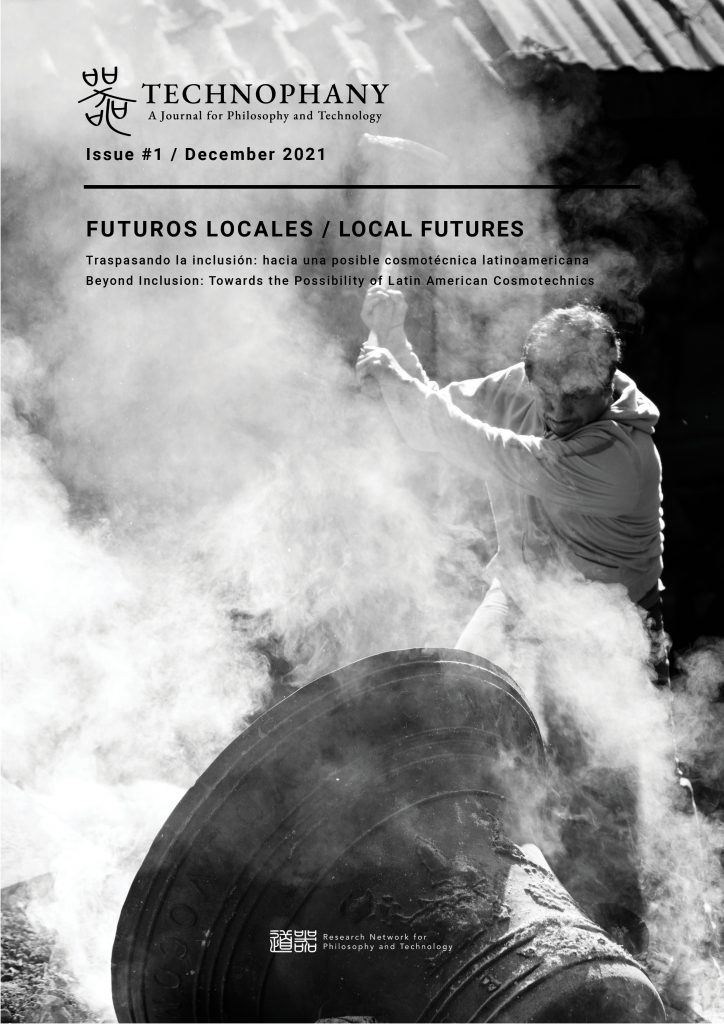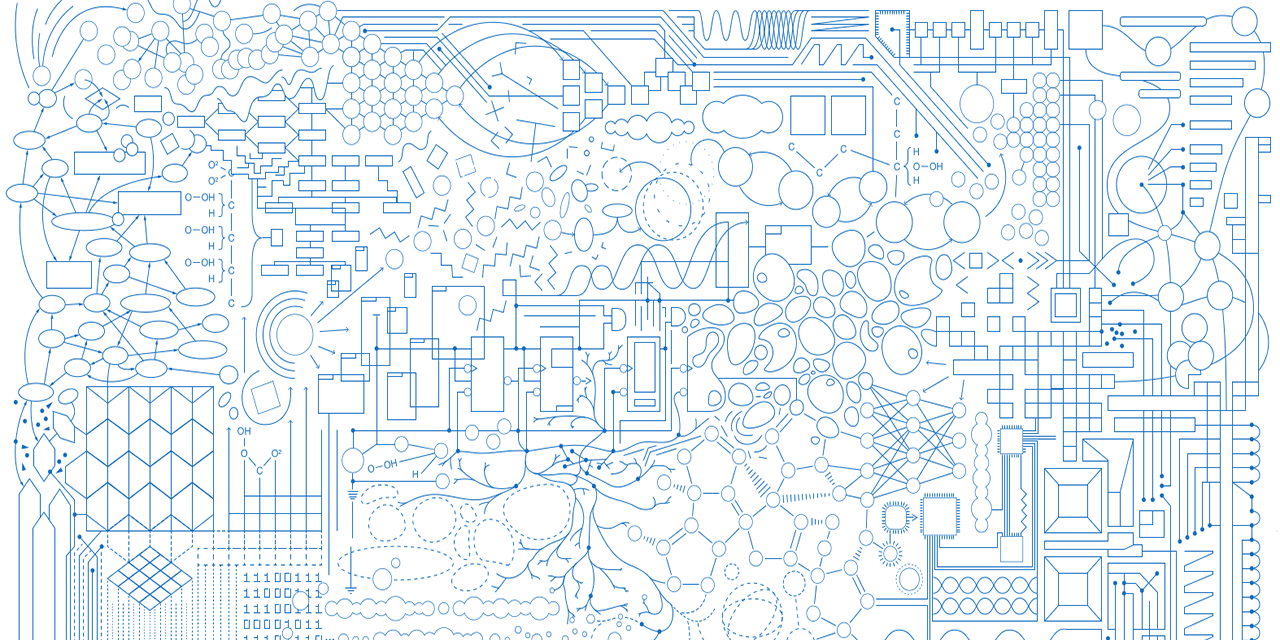Enlightenment Now
Steve Fuller, Frederik Stjernfelt and c:o/re are hosting this one-day workshop April 21st 2022
Enlightenment Now
In this seminar, we’d like to draw a line between recent intense research into the intellectual history of the Enlightenment and our present situation. What would Radical Enlightenment mean today? How would a 17-18th century Enlightenment view on our present predicament look like? – given pressing issues of academia today, the fate of the universities, the development of AI, tech, the new West-East cold war, populism, globalization, post/trans humanism, the future of humanity?
To attend online please register with events[at]khk.rwth-aachen.de
Program
10:00-11:00
Free Speech and Enlightenment: Lessons from the World’s First Full Press Freedom
Frederik Stjernfelt (RWTH Aachen/ University of Aalborg Copenhagen)
Abstract
September 14 1770, full press freedom was suddenly declared in Denmark-Norway by king Christian VII and his German favorite, the radical enlightener doctor J.F. Struensee. That signaled the beginning of the dramatic three-year Press Freedom period, effectively kickstarting modern debate in the double kingdom. In the middle of the period, there was a coup, Struensee was decapitated after a mock trial, and Press Freedom was slowly smothered. What can be learned from this strange event of the High Enlightenment?
11:00-12:00
Condorcet’s Predicament- can the democratic republic work?
Jonathan Israel (Institute of Advanced Study, Princeton)
Abstract
Those late Enlightenment figures such as Condorcet, Destutt de Tracy, Paine, Palmer and Barlow and others who had reason to feel profound disappointment and pessimism at the defeat of their plans during the 1790s and opening years of the nineteenth century, apparently nevertheless refused to give up hope of eventual success. But they could hardly avoid a lot of soul-searching and especially asking themselves what are the minimum requirements needed to ensure the stability, viability and survival of a modern democracy. Significantly, all of these tended to see the solution in restructuring, in fact revolutionizing education.
12:00 – 12:15
Coffee Break
12:15-13:15
In Favor of Patterns: Reviving an Enlightenment Ideal
Rens Bod (University of Amsterdam)
Abstract
There are two opposing traditions in the longue durée history of the humanities: one which searches for patterns and regularities (in texts, languages, art, music and the past) and one which rejects any notion of pattern and focuses on the unique and the exceptional. This opposition is found already in 250 BCE between the Analogist school of Alexandria and the Anomalist school of Pergamon and has not disappeared ever since. And yet, there have been periods when the search for patterns, regularities and underlying principles was dominant. The golden period of pattern-seeking was the Enlightenment: patterns were discerned in history by Vico, Condorcet and others, patterns were found in music to build musical grammars by Rameau and Koch among others, and principles were found to underlie languages (De Laet, Hemsterhuis), art (Bellori, Winckelmann) and literature (Boileau, Gottsched), not to speak about the search for patterns and principles in the natural world that has become dominant ever since. Very few of the Enlightenment patterns found in the cultural world have stood the test of time though, but the endeavor to try to understand the world by patterns and underlying principles remains a major feat of the Enlightenment. The opposition between patterns and the exceptional flared up again in the 19th century and arrived at a zenith after WWII with the advent of the Frankfurt School and the postmodern turn. And yet the search for patterns has recently shown a revival in the humanities with the appearance of new disciplines such as digital history, comparative global humanities, environmental humanities and digital humanities. I will show that the return to pattern-searching has also influenced the more traditional humanities disciplines, from philology to art history, and has resulted in a myriad of new discoveries in art, music, literature and history. I will argue that the revival of the Enlightenment ideal of pattern seeking may arguably be the only way for the humanities to survive.
13:15-15:00
Lunch Break
15:00-16:00
Kant Between Swedenborg and Linnaeus: A Fork in the Road to the Enlightenment’s Legacy
Steve Fuller (c:o/re RWTH Aachen/ University of Warwick)
Abstract
I am currently writing a play about a possible but fictional event that would have Kant travel from Königsberg to visit Carolus Linnaeus and Emanuel Swedenborg, who made their reputations in Uppsala. The lives of the three significantly overlapped in time, and Kant was significantly influenced by the two Swedes – to be sure, more positively by Linnaeus than by Swedenborg. However, the three never met. Even Linnaeus and Swedenborg are known to have only met once, namely, when Linnaeus turned over his Stockholm flat to Swedenborg in 1741. Nevertheless, the fictional encounter is significant for marking a fork in the road of the Enlightenment’s legacy, which becomes clearer in the later, ‘critical’ phase of Kant’s career, on which his own reputation as the foundational figure of modern philosophy is based.
My play takes place in 1756, the year after the famous Lisbon earthquake that inspired Voltaire to write Candide and provoked a wide-ranging discussion of theodicy across Europe, epitomized by the question: Do we live in a just world? In that year, Kant was 32, Linnaeus 49 and Swedenborg 68 – each belonging to a different generation. For Kant, Linnaeus was someone who understood the empirical limitations of the ape-like nature of the human condition better than Swedenborg, even though Swedenborg’s more adventurous speculations about the powers of the human mind were often based on a remarkably prescient understanding of the brain’s workings. Kant’s first book, Dreams of a Spirit-Seer (1766) was a comprehensive takedown of Swedenborg, which anticipated his later scepticism about ‘pure reason’.
The play is very much a work in progress, and I plan to discuss the various considerations that the two Swedes might try to bring to bear on Kant, who himself reaches a kind of divided judgement on the matter, which is reflected in his later strong distinction between ‘pure’ and ‘practical’ reason, which effectively has noumenon do double duty in the epistemological and ethical realms.
16:00 – 16:15
Coffee Break
16:15-17:15
The Enlightenment Now: The Human Skeuomorph://Public-Private
Cheryce von Xylander (Leuphana University Lüneburg)
Respondent: Steve Fuller (c:o/re RWTH Aachen/ University of Warwick)
Abstract
This talk about the deep, taken for granted legacy of the Enlightenment, is based on the technological capabilities that were unleashed and largely celebrated in the eighteenth century. Social platforms have migrated discursively from purveyor of a utopian future that would unite users in egalitarian online activity to public enemy that threatens to wreck the democratic cultural order. This trajectory from paragon to pariah has much to teach us about human self-fashioning in the advanced capitalist, neoliberal dreamscape. It should give pause that a service sector that arose from the defence arsenal of the military-industrial complex ever inspired blind faith in its potential to better the human condition. An epistemic prosthetic as powerful as the vast knowledge repository that is the internet will rework cognition. The online industry is forever aggregating digital traces of enacted rationality. This smart techno-habitat systematically conceals what it emphatically re-enacts, namely figuration of the modern user as an aesthetic contrivance conjured in the eighteenth century. I propose to call this enabling latency the human skeuomorph. Skeuomorphism is a concept used by archaeologists to describe aesthetic attributes that outlast their utility in tool evolution. Like other tools in the archaeological record, the human skeuomorph has been subject to material transformations, yet persists as a semiotic undercurrent. The retooling of this apparition in new media will hinge on future interpretations of its Enlightenment past.
17:15 – 17:45
Closing Discussion
Farewell and Welcome!
Professor Alexandre Hocquet has now completed his c:o/re senior fellowship. We are grateful to Alexandre for the nice times in Aachen and for his invaluable contributions to our Research Centre. We look forward to continue our joint ongoing projects together! As a glimpse into his work at c:o/re, you can Steal this Blog Post!
We are now excited to be welcoming some new-coming fellows at c:ore: Welcome Professor Nicko Stehr, Professor Markus Rautzenberg and Dr. Fernando Pasquini-Santos!
Lecture Series
As we are about to start the summer term with our new Lecture Series, “Philosophy of AI – Optimist and Pessimist Views“, you can now also listen to some of the talks of the previous series on the “Digitalization of Research”. The recordings can be found in our archive.
Joffrey Becker talks about human-machine interactions and social changes associated to the design of intelligent systems. Markus Pantsar takes a complexity perspective on human-like numerical cognition in Artificial Intelligence and Alexandre Hocquet portrays the possibilities, limits, and consequences of the concept of “openness” in science and research.
Solidarity with Ukraine
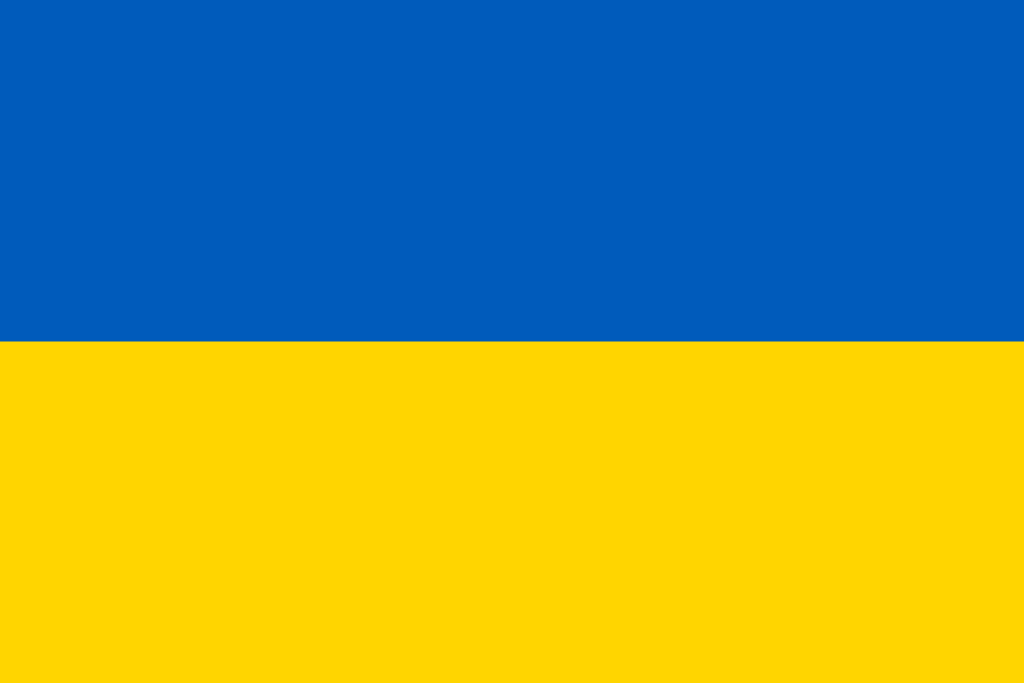
Together with all our colleagues at RWTH Aachen University and worldwide, we condemn the Russian attack against Ukraine and the violence and terror that is raging there for a week now. Our thoughts and solidarity go out to the many people affected by this war.
The university has issued a statement and published an interview with Prof. Ralph Rotte from the Institute for Political Sciences. Currently, the university organizes an aid program for hospitals. Below, you can find some websites that provide further background information on the war in Ukraine:
- Science for Ukraine collects information about practical support for students and researchers directly affected by Russia’s invasion of Ukraine.
- SUCHO is an initiative by cultural heritage professionals to save Ukranian Cultural Heritage online.
- Statement by Russian scientists against the war in Ukraine.
- HSozKult – Collection of historical background information by the communication and information service on historical research (German).
- The online platform dekoder offers background info and analyses (German).
- You can help the Association KONTAKTE-KOНTAKTbI in their support for surviors of the Holocaust in Ukraine.
c:o/re in the local newspaper: RWTH researches… future research

We are in the News! The local Aachener Zeitung talked to our directors about c:o/re’s kick-off last year and the overall rationale of the center: exploring the different cultures and the future of research in times of digital transformation and global challenges. As the article reports, the idea is to make space for interdisciplinary exchange: “to think outside the box, exchange ideas, and share our findings with the broader public.”
Explainable AI – Explanations in AI
We are excited to announce the second c:o/re workshop, “Explainable AI – Explanations in AI”, organized by Markus Pantsar and Frederik Stjernfelt. It will take place on the 2nd and 3rd of February.
Abstract
One important challenge in machine learning is the “black box” problem, in which an
artificial intelligence reaches a result without any humans being able to explain why.
This problem is typically present in deep artificial neural networks, in which the hidden
layers are impenetrable. To tackle this problem, researchers have introduced the notion
of explainable AI (XAI). In this workshop we discuss a variety of approaches to this topic in connection to fundamental questions in artificial intelligence. What are explanations in AI? What do AI systems explain and how? How does AI explanation relate to the topics of human understanding and intelligence?
For information on the program and participating, please see the links below.
“Only the Initiates Will Have the Secrets Revealed”
Tune in for the next talk in our Lecture Series “Cultures of Research – Digitalization of Research“. On Wednesday, January 26th, Alexandre Hocquet (Fellow c:o/re Aachen, Archives Henri Poincaré) will talk about the Politics and Materialities of Open Science.
The talk focuses on software in science and its diversity of entanglements with openness. Software has been “eating” the world, and science is no exception. From Excel to complex “big” scientific instruments, via Photoshop or molecular modelling software suites, the vast majority of software used in science is not open, and a vast majority has nothing to do with computer science. When software is open, it is very often naively represented as a solution to all issues in science, especially reproducibility. Yet, even open software is full of epistemic issues, from governance to consistency, and the consequences of its influence on the rest of open science are often misunderstood, especially regarding licensing policies.
c:o/re panel @ EASST 2022
The c:o/re Team will be chairing a panel at the EASST conference “Politics of Technoscientific Futures” in Madrid, July 6 to 9, 2022. Our panel “Making Media Futures” focuses on the role of different media in making and disseminating scientific imaginaries of the future and on their variations according to their interactions with different communities and contexts. If you want to contribute to our panel, send us an abstract with your ideas through the conference website form. The full call for abstracts can be found here. The deadline is February 1st, 2022, has been extended to February 7th. Looking forward to seeing you in Madrid!
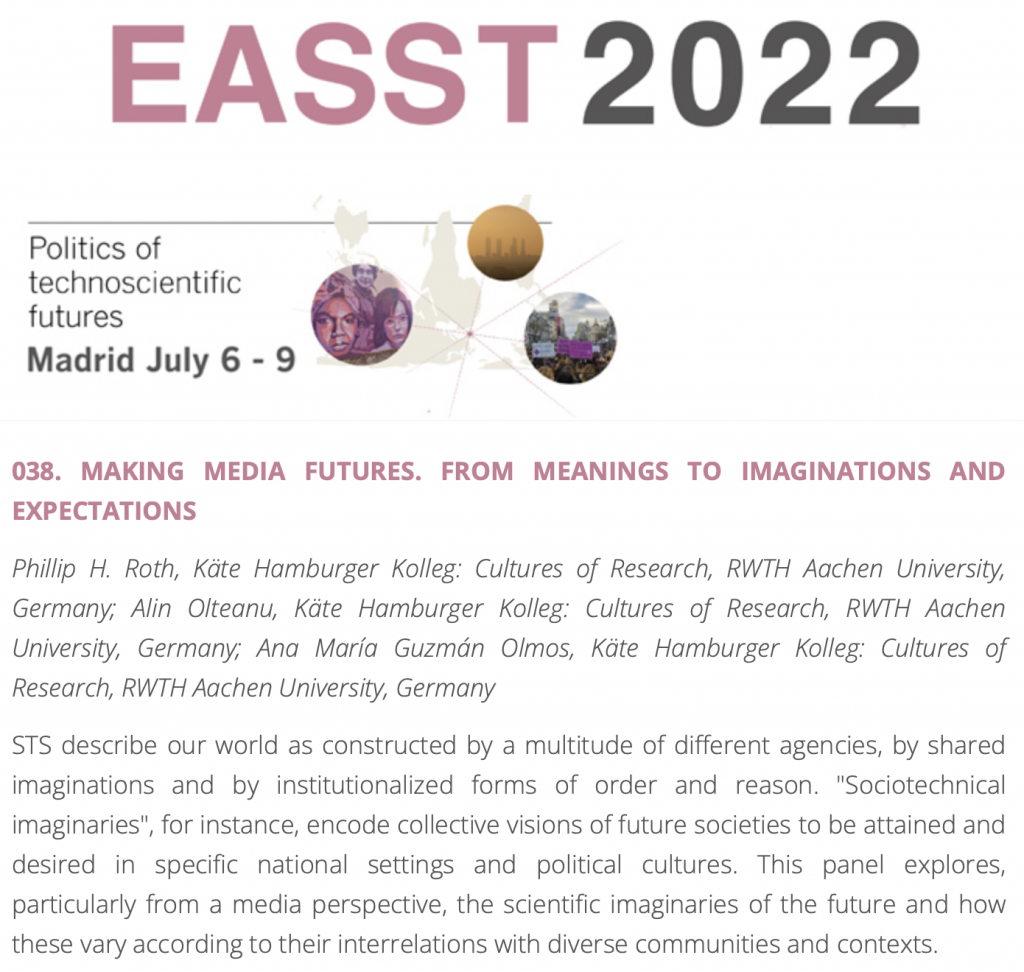
New Year – New Fellows
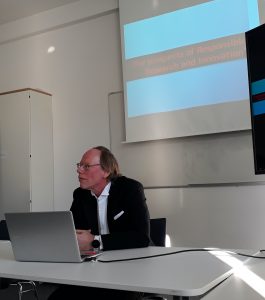
This week, we welcomed René von Schomberg and Catharina Landström at RWTH Aachen university. Like Andoni Ibarra, who arrived at c:o/re in December, René von Schomberg is working on responsible innovation in research with a focus on the value of ‘openness’.René von Schomberg is a Guest Professor at the Technical University of Darmstadt, Germany, and counselor to the European Commission. In a hybrid lunch talk, he gave us a glimpse into his research program for the coming months.

STS scholar Catharina Landström, Associate Professor with a focus on environmental studies at Chalmers University of Technology in Gothenburg, Sweden, is also touching on the subject of open science. After years of intensive field work with a focus on water systems challenges, she is happy to delve into critical text analysis for the coming six month. She will explore how experts argue in writing and how they convey to environmental decision makers the validity, relevance and reliability of knowledge in the face of computer simulation modelling.
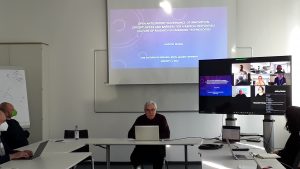
This introduction of the new projects refreshed the academic debate among fellows, as new overlaps unfurled. Upcoming events are meant to further explore these junctions.
Technophany: Local Futures (Special Issue #1)
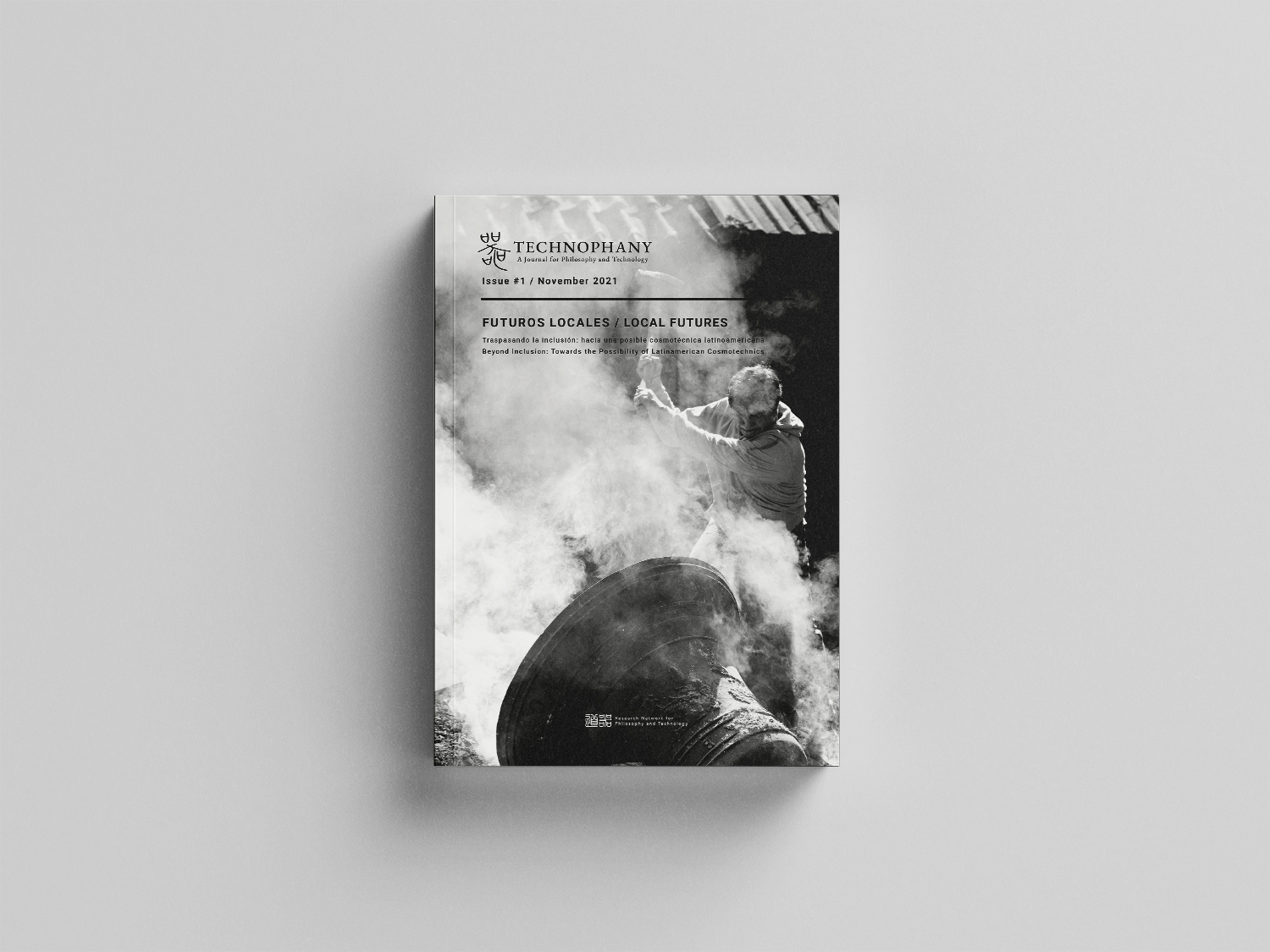
We are very pleased to announce the online first launch of the first special issue of the Journal Technophany, edited by sound artist Hugo Esquinca and our team member Ana María Guzmán Olmos. Technophany is a journal published by the Research Network for Philosophy and Technology and is dedicated to the thinking of science and technology in their historical and philosophical dimensions. This special issue considers Yuk Hui’s concept of cosmotechnics as starting point to reflect on particular Latin American technologies, technical thought and philosophy of technology, as well as the question of what does it mean to speak of local technologies in general.
The issue follows the format online first and, in this spirit, the articles will be released biweekly, thus giving space for debate and conversations around each singular article. Since the editors think that it is not possible to speak of local techniques and thought without listening to the local scholarship, the issue is bilingual so that each author could feel comfortable writing in the language in which they are used to contribute to knowledge.
The aim of this publication is to expand the discussion and the community of debate around Latin American technical thought and techniques. In this sense, we started a conversation with philosopher of technology Yuk Hui and the editors, where we expand on the possibility of thinking with the notion “cosmotechnics” across different cosmologies and particular contexts by bringing to the front the different problems and topics opened up by the articles.
In parallel to the open dialogue with Hui, a series of conversations in Berlin’s Cashmere Radio will be broadcasted live and online. The conversations will kick off with a dialogue between the editors (Hugo and Ana) and Fernando Wirtz, author of the paper “Cosmotechnics as Method: Beyond Geoculture” on January 17th (tbc).
We’ll be updating on upcoming events and radio conversations here and on the Networks social media.
You can read the Issue here:
